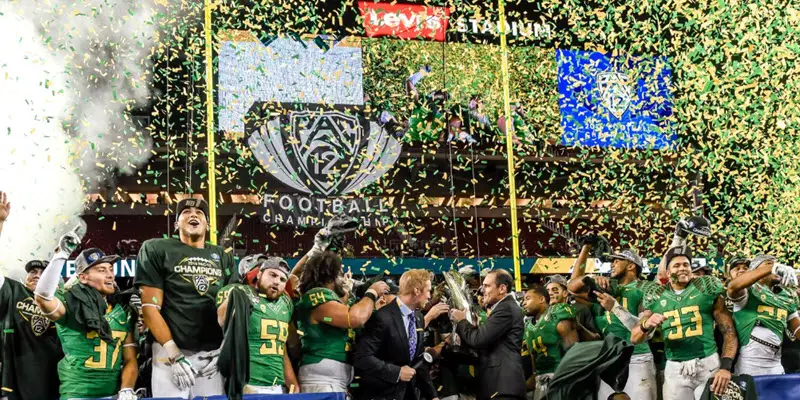My friends–we have progressed as a site because such an amazing group of Oregon fans who have turned the comments below articles into a “high-brow” discussion of Oregon sports that will always be “TROLL-FREE.”
I am always interested in a short article to start a discussion, a “Ponder-Point” if you will, and a reader brought us a tremendous topic for us to consider. If you have a topic–email it to me and we’ll publish it. And do support a fellow reader and give us your thoughts on this very important subject below. Charles Fischer
——————————————————————————————————————
For the Greybeards out there … remember when growing up how we would flip on the TV, and listen to the silky smooth voice of Keith Jackson, as USC or UCLA played in front of a national audience? What I remember as an Oregonian was how lopsided the scores sometimes were, and it wasn’t uncommon for me to see an Oregon or Oregon State team lose to USC or UCLA by the score of 10-31, 0-21, 0-56, 9-31, 17-50, 0-53, 7-38. It felt like we weren’t even in their league at that time.

Keith Jackson
The Oregon schools are more competitive now. What happened? I’d like to briefly traverse some history.
When the Pac-12 was formed in 2011, I thought the Oregon teams were at a huge disadvantage being in the North Division, because the southern California teams would have a quick road to the title game to play a weaker team. I would be wrong, but how could my Kolchak, the Night Stalker, senses be so off?
Let’s step back into the late 1970s for a moment, back to the days of Sinister Cinema (“Where every night is Halloween”), and quickly travel forward to today.
Back in 1978, the Pac-8 (the four California teams and two each from Oregon and Washington) expanded to the Pac-10 by adding Arizona and Arizona State. The Pac-10 was a successful and stable league from 1978-2010. In 2011, several colleges on the East coast switched leagues, setting off a flurry of small seismic shifts that led to an all-out continental realignment of the NCAA landscape.
Massive tectonic moves by conferences made conference presidents appear like CEOs of corporations, swallowing up smaller entities in buyouts or hostile takeovers. When the dust settled out West, the Pac-10 had become the Pac-12, by offering Utah an opportunity to upgrade from the Mountain West Conference and seducing Colorado away from the Big 12.
With 12 teams in the PAC conference, and creating new “Championship Games” in vogue with conferences, the Pac-12, for the first time, divided teams into North and South divisions along mostly geographical lines; the winner of each division would play in a Championship Game to determine the Pac-12 Champion at the end of the season.
Pac-12 North Teams
Washington
Washington State
Oregon
Oregon State
California (Berkeley)
Stanford
Pac-12 South Teams
Arizona
Arizona State
USC
UCLA
Colorado
Utah

Pete Carroll did a ton of winning at USC…
That’s how we got the North and South divisions. So where did it come from that I thought the South division would dominate? Remember all those blood-curdling scores I had seen as a kid late at night before Frankenstein or Dracula would appear? There was a history of domination there. Perhaps the fear was ingrained into my psyche.
There were three dominant teams in the 1980s-2000s in the Pac-10: USC, Washington, and UCLA. These three teams won or shared league titles in 27 of 33 years. Repeat. USC, Washington, and UCLA won or shared close to 85% of the league titles in Pac-10 football over a thirty-year span.
Pac-10 League Titles from 1978-2010
USC 15
Washington 7
UCLA 7
Oregon 5
Arizona State 3
Stanford 2
WSU 2
California 1
Oregon State 1
Arizona 1
NOTE: there were nine years where the league title was shared by two or more teams in the Pac-10 as the league title was based on total wins in conference play.
If we superimposed the divisions present today in the Pac-12 on the old Pac-10, the Pac-10 “South” would win 18 out of 29 league titles by the division outright, removing shared titles. And if you consider shared titles, USC and UCLA alone combined to win league titles in 20 out of 33 years of the Pac-10.
Fast forward to 2011. In struts the new and fancy league, now with the addition of Colorado and Utah. How have those league “Champions” shaken out over the first seven years of the new Pac-12?
Pac-12 League Titles since 2011
Stanford (North) 3
Oregon (North) 2
Washington (North) 1
USC (South) 1

David Shaw has won the most Pac-12 Championships.
Of the seven league titles determined by a Pac-12 Championship Game since the formation of the Pac-12 in 2011, a North team has won six titles to the South’s one title. USC just won its first Pac-12 league championship last year in 2017. Of the North teams, Oregon and Stanford have won five titles in seven years of the Pac-12. So here’s where that history lesson becomes so warped: in the whole history of the Pac-10, Oregon and Stanford combined for just seven league titles in 33 years.
I want your thoughts. What happened? Share your experience with the old Pac-10 or share your insights about the Pac-12. Are we seeing a trend? An anomaly? Is a correction coming? What caused the downfall of USC and UCLA? The rise of Stanford and Oregon seems unique. Share your points on coaches, athletic directors, finances, recruiting, and larger trends.
Why has the Pac-12 North dominated the South in the Pac-12 Championship football titles, and will it continue?
UGLY DUCKLING
Located somewhere in Oregon…
Tonight’s Pac-12 Championship game starts at 5:00 pm PST.
No. 11 Washington (9-3) against No. 17 Utah (9-3).
The Huskies are 4 to 7 point favorites over the Utes.
Top Photo by Kevin Cline
 Bob Rodes, the FishDuck.com Volunteer editor for this article, is an IT analyst, software developer and amateur classical pianist in Manchester Tennessee.
Bob Rodes, the FishDuck.com Volunteer editor for this article, is an IT analyst, software developer and amateur classical pianist in Manchester Tennessee.
Related Articles:
Unbelievable...Same SEC Stuff, Different Day
Why Oregon Football Always Belongs in the National Conversation
The B1G Won the 2026 Coaching Carousel...Big-Time!
Continuity? Lanning's Hiring Success is Put to the Test
Why Whether Dyer Was Down or Not...Doesn't Matter
How to Analyze Football Talent Like a Pro

Charles Fischer has been an intense fan of the Ducks, a season ticket holder at Autzen Stadium for 38 years and has written reports on football boards for over 26 years. Known as “FishDuck” on those boards, he is acknowledged for providing intense detail in his scrimmage reports, and in his Xs and Os play analyses. He is single, has a daughter Christine, and resides in Eugene Oregon where he was a Financial Advisor for 36 years.
He now focuses full-time on Charitable Planned Giving Workshops for churches and non-profit organizations in addition to managing his two Oregon Football Websites, of FishDuck.com and the Our Beloved Ducks forum. He is a busy man!
He does not profess to be a coach or analyst, but simply a “hack” that enjoys sharing what he has learned and invites others to correct or add to this body of Oregon Football! See More…

